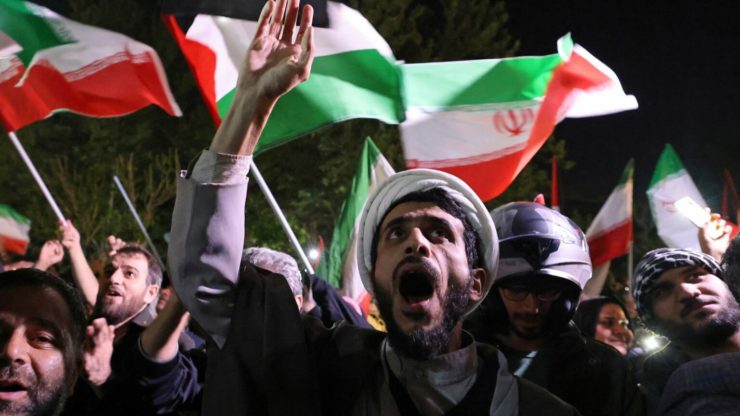
The dates of 7 October 2023 and 13 April 2024 will go down in the history of the Middle East as milestones that defined a new balance of power. The myth of Israel’s military superiority and the invincibility of its army will be gone forever.
The Gaza massacre, which caused enormous loss of life and destruction, effectively isolated the Netanyahu government in the international community. Only the US and a few other Western powers provided diplomatic cover for his military provocations.
When the Israelis attacked the Iranian consulate in Damascus on 1 April, killing senior officers of the Islamic Revolutionary Guard Corps (IRGC), Western countries disrupted the UN Security Council’s discussion of this terrorist act by refusing to condemn this clear violation of international law.
In Tehran, many political forces demanded a response to this monstrous crime, and Iran’s representative to the UN made it clear that the Iranian authorities would be prepared to refrain from using force if the UN Security Council took a clear decision to condemn the attack.
On 13 April, Iran fired more than 300 drones and missiles at Israeli military installations – the first time in history that the Iranians have attacked Israel directly from their own territory. This was essentially the beginning of a new policy line for Tehran, which had previously been guided by the “concept of strategic patience”, avoiding direct attacks against Israel and the United States.
Iran used only a small fraction of its missile arsenal and warned that it was ready to use its new cruise and hypersonic missiles in the event of an Israeli attack: only military targets were targeted on 13 April, and the entire operation was conducted in such a way as to avoid civilian casualties.
Tel Aviv announced that almost 99 per cent of the Iranian drones and missiles had been intercepted by its Iron Dome air defence system, as well as by US, British and French anti-aircraft systems.
Significantly, after hesitating to condemn Israel’s attack on the Iranian consulate in Damascus, the Western powers were quick to criticise Iran’s attack on Israel in the strongest terms. “A parade of hypocrisy and double standards,” Russia’s UN representative called such actions, stressing that if the strike had hit the diplomatic missions of any Western country, the uproar and wave of protests would have been unprecedented. The Al-Jazeera website noted that the positions of the Western powers in this case looked “disgustingly cynical”.
Even the US press wrote that between early December and late March Israel killed about a dozen commanders and advisers of Iran’s Islamic Revolutionary Guard Corps, culminating in an attack on the Iranian diplomatic mission in Damascus. Iran’s Supreme Leader Ali Khamenei said that ‘an attack on our consulate is tantamount to an attack on our country’. The Iranians have warned the US and many countries in the region that they will retaliate, but in a limited and proportionate way.
The attack on Israeli military targets on 13 April was a clear reminder of Iran’s ability to set a precedent for a direct attack on Israeli territory. The US President was quick to declare that Washington would not go to war with Iran and would not support a military strike by Tel Aviv in response to an Iranian attack.
Russia and China, as well as many other countries in the Global South, called for restraint to prevent the conflict from escalating into a regional war.
In Israel itself, hawks are calling for an immediate retaliatory strike against Iran. “Israel,” wrote the Washington Post, “has every moral right to order air strikes against Iran, but it would be strategically unwise. Iran is a country of 88.5 million people, while Israel has only 9.5 million. Iran has more than half a million active military personnel, a sophisticated arms industry and a vast network of powerful proxies throughout the region. Israel can damage Iran, but it cannot defeat it” (Iran has a land area of 1,648,000 km² and Israel 22,145 km²).
The article’s author, administration-aligned columnist Max Boot, notes that the Biden administration is rightly reluctant to get involved in a war with the Islamic Republic, which would likely lead to a spike in oil prices and a global economic downturn. Biden is urging Netanyahu to exercise restraint, but the question is whether the Israeli prime minister will listen.
In general, everything that is happening in the Middle East is evidence of a serious weakening of the US position (the Americans are complaining that the Israelis did not warn them about the attack on the Iranian consulate in Damascus). Having failed to prevent the massacre of Palestinians in Gaza, Washington is unable to stop even its closest ally from acting recklessly. The countries of the region are watching all this closely and drawing the appropriate conclusions. According to the editor-in-chief of the Saudi newspaper Asharq Al-Awsat, recent events are noticeably increasing Iran’s soft power in the Muslim world.
No matter how the situation in the Middle East develops in the near future, the trend of declining US influence and growing Iranian importance is becoming quite obvious.
Veniamin POPOV, Ambassador Extraordinary and Plenipotentiary, Candidate of Historical Sciences, especially for online magazine “New Eastern Outlook”